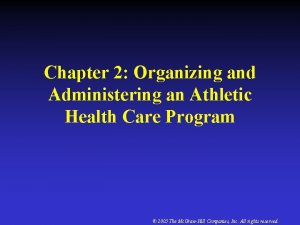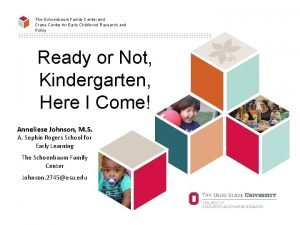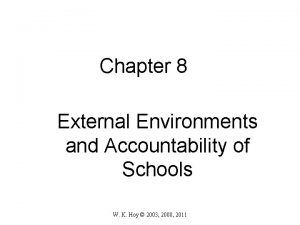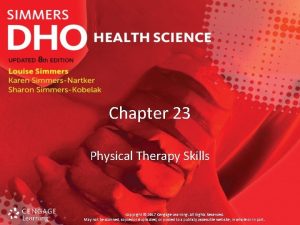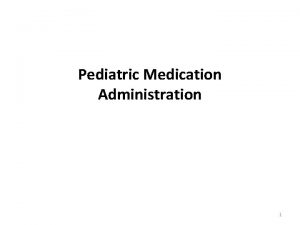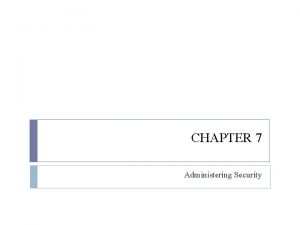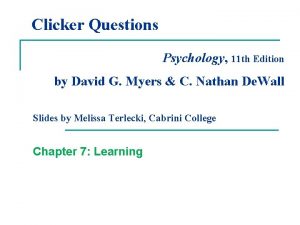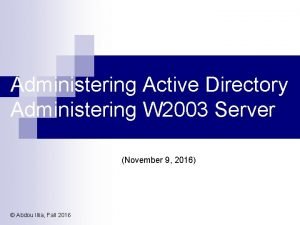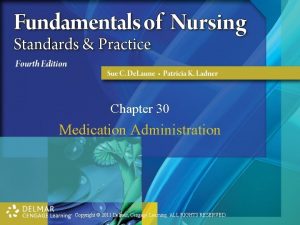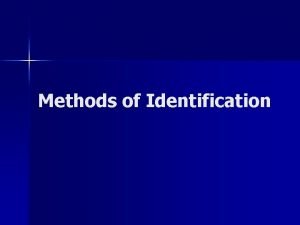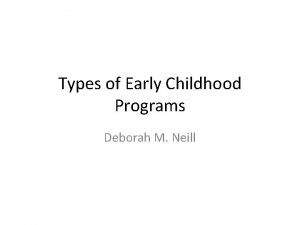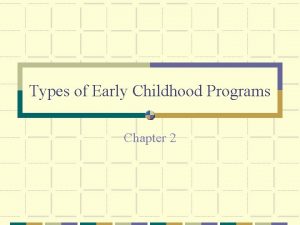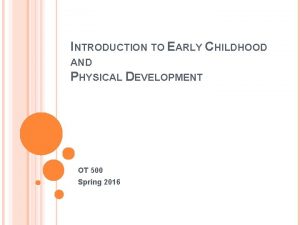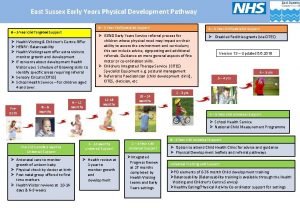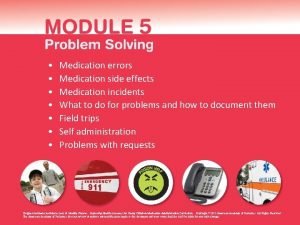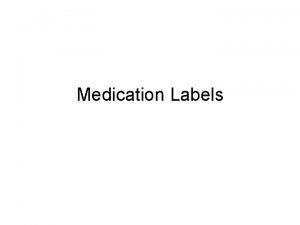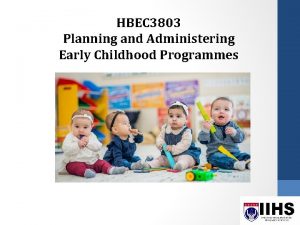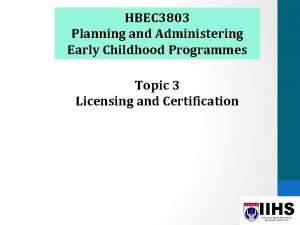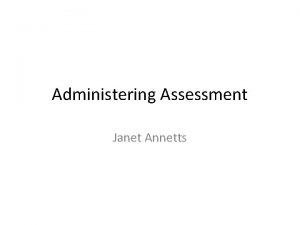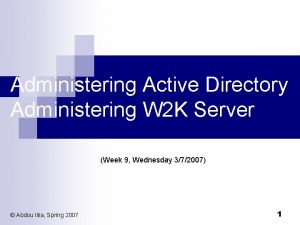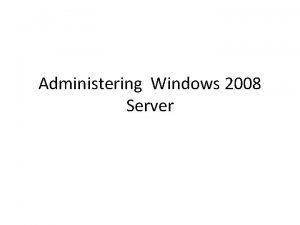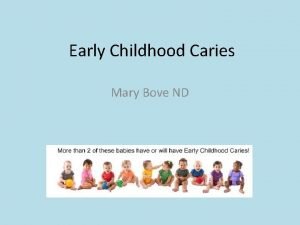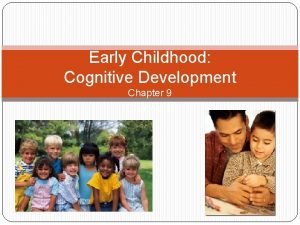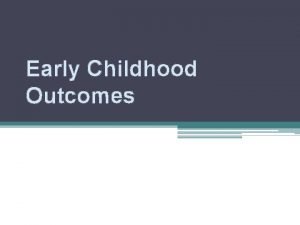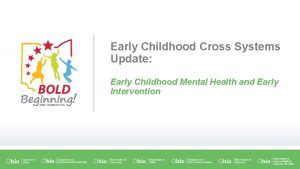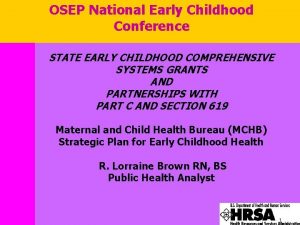Administering Medication in Early Childhood Care Identification and























- Slides: 23

Administering Medication in Early Childhood Care; Identification and Care of Children

First things first… • If a medication can be given at home and not brought into the center at all, this is ideal. • For example: medications prescribed to be taken three times a day (TID) could be given at home: before center, after center, and in late evening/bedtime. • Discuss with parents these options before making the decision to store and administer a medication at center. Home before child care center if possible! (We know this isn’t always possible. )

Medication Assistance • Performance Standard • 1304. 47(b)(4)(i)(C)(D)(3)(e)(2) • Minimum Standard§ • 746. 3801, § 746. 3803 3807, 3809, 3811, 3815, 3817, 3818, 3819 • Policy Statement: UTRGV PS. JA ISD EHS CCP Program staff will administer medication to children as per Licensing Requirements.

Medications in child-care center • Prescription (ordered by a health care provider…MD, dentist, nurse practitioner, physician assistant) • • ADHD meds: most are a controlled substance (oral, transdermal patch) Antibiotics (oral, ear drops, eye drops) Anti seizure meds (oral, rectal Diastat™) Diabetic meds: insulin, Glucagon® (injections) Asthma meds: (inhaled, oral) Epi. Pen® (injection) Others • OTC (over the counter) medications • • • Acetaminophen (Tylenol®) Ibuprofen (Advil®, Motrin®, etc. ) Cetirizine (Zyrtec®) Diphenhydramine (Benadryl®) Others

What authorization must I obtain before administering a medication to a child in my care? • (a) Authorization to administer medication to a child in your care must be obtained from the child' s parent: In writing, signed and dated; In an electronic format that is capable of being viewed and saved; By telephone to administer a single dose of a medication. Authorization to administer medication expires on the first anniversary of the date the authorization is provided. • The child's parent may not authorize you to administer medication in excess of the medication' s label instructions or the directions of the child's health care professional. • Parent authorization is not required if you administer a medication to a child in a medical emergency to prevent the death or serious bodily injury of the child, provided that you administer the medication as prescribed, directed, or intended. • •

How must I administer medication to a child in my care? • (b) Medication must be given: • As stated on the label directions; • As amended in writing by the child's healthcare professional • (c) Medication must: • Be in the original container labeled with the child's full name and the date brought to the operation; • Be administered only to the child for whom it is intended; • Not be administered after its expiration date.

When you administer medication to a child in your care, you must record the following: • Full name of the child to whom the medication was given; • Name of the medication; • Date, time, and amount of medication given; • Full name of the employee administering the medication. • You must keep all medication records for at least three months after administering the medication. • Document on Caregiver's Record of Administering Medication (CCL 7238)

How must I store medication that I administer to a child? • Keep it out of the reach of children or in locked storage; • Store it in a manner that does not contaminate food; • Refrigerate it, if refrigeration is required, and keep it separate from food.

How long may I keep the medication that I administer to a child? • You must dispose of the medication or return it to the parent when the child withdraws from the child care center, or when the medication is out of date or is no longer required for the child.

What is specialized medical assistance? • Specialized medical assistance is any medical assistance other than medication. Examples include, but are not limited to, assisting with an apnea monitor, protective helmet, or leg brace.

What are my requirements regarding specialized medical assistance? • If a child in your care requires specialized medical assistance, (example, Plan of actions, seizure, asthma, allergy) then you are required to provide specialized medical assistance as recommended or ordered by a health care professional. • If you are provided with a written copy of the health care professional's recommendations or orders, you must maintain this written information in the child's record for at least three months after the health care professional has indicated that the specialized medical assistance is no longer needed.

The Five "R"s: • Know the five "R's" of medication administration • Right child, • Right time, • Right dose, • Right route, and • Right medication. • Medications are serious business…even OTC ones

Cont. • Designated staff will administer medication and document on the Medication Administration Log: • the name of the child, medication, physician, then the prescription number, expiration date, dosage, time to be administered and date medication administration ends. • Staff will check the allergy list to make sure the child is not allergic to medication. • Each time medication is administered staff will document the date, their name, signature, dosage and time given on the Medication Administration Log. • Staff will not administer medication to a child who is crying or fighting. This increases chances of choking. Notify the physician and determine administration of medication.

Cont. • Staff will use Medication Administration Log and document not given, the reason, and notify parents and physician when medication is given. • Staff will document on the Medication Administration Log any observable side effects and notify accordingly. • Staff will document identified side effects on Incident Report, notify parent immediately and give them a copy.

Tablets & Capsules • Most oral tablets and capsules should be taken with water. • Rule of thumb, give with water unless otherwise directed. • Chewable tablets should be chewed until they are dissolved completely. They are not meant to be swallowed. • Some “soft chew” medications are meant to melt in your mouth or be chewed.

Liquid medications • Liquid medications: • Only use measuring devices made for medications. • Household teaspoons are not an accurate method to measure meds. • Shake the bottle if indicated as some medications settle to the bottom. • Measure at eye level. • Place on flat surface and crouch down so you are eye level with the measuring device (preferred method).

Know your conversions • Be sure you know the correct dose. Don’t guess!

Inhaled medications • Inhaled medications are generally those used to treat asthma. • Inhalers: Metered Dose Inhaler Dry Powder Inhaler Metered Dose Inhaler with Spacer

Inhaled medications • Nebulizers: Mouthpiece Mask Nebulizer Machine

setting • Medication administration should be conducted in a quiet, private place. • Privacy of student • No distractions

Do’s and don’ts • DON’T… • • • Give a child’s somebody else’s medication Skip a dose Crush or break pills unless instructed to by a medical provider/pharmacist Change the dose or timing Give medication that is not in original package, bottle or container • DO… • • • Know the medication you are giving Give the medication exactly how it’s prescribed Have a written order from a medical provider Follow the 5 “R”s Rights Watch expiration dates Give in private, non distracting setting

Procedure for Medication Error Form Staff will notify the child's physician and follow his/her instructions. Staff will know the name of the medication and the dosage given. Staff will notify the child's parents and explain the error. Staff will notify Center Manager/Director. Staff will document using the Medication Error Form. Staff will use the Incident Report to document the time child left the center with the parent and the child's condition at the time he/she left (alert, talking, no apparent effects of medication, drowsy, slurred speech, recognized parent, or taken to hospital at 3: 20 P. M. , etc. ). • Notify the Director/Center Manager and the Grantee Directors. • • •

documentation • Factual information, no opinions. • Never white out, scribble over, cover up, or erase what has already been written. • If error in documentation, draw single line through incorrect information and initial. • Don’t use abbreviations. • Write legible so it is easy to read. • Black or blue ink is best, if handwritten. No pencil. • Computerized: nothing that has previously been a part of the child’s medical file should ever be deleted. • RULE OF THUMB… • “IF IT’S NOT DOCUMENTED, IT’S NOT DONE”!
 Infancy early childhood middle childhood adolescence
Infancy early childhood middle childhood adolescence Acecqa self assessment tool
Acecqa self assessment tool Chapter 2 worksheet organizing and administering
Chapter 2 worksheet organizing and administering Ecetp trainings
Ecetp trainings The crane center ohio
The crane center ohio External environment and accountability of schools
External environment and accountability of schools Chapter 23:1 performing range of motion
Chapter 23:1 performing range of motion Volutrol administration set
Volutrol administration set Administering security
Administering security Administering something that is undesired is called
Administering something that is undesired is called Administering active directory
Administering active directory Chapter 30 administering medications
Chapter 30 administering medications Chapter 30 administering medications
Chapter 30 administering medications Central pocket vs plain whorl
Central pocket vs plain whorl Primary secondary and tertiary care
Primary secondary and tertiary care Types of early childhood programs
Types of early childhood programs Types of early childhood programs chapter 2
Types of early childhood programs chapter 2 Elof standards 3k
Elof standards 3k Early childhood framework for quality
Early childhood framework for quality Green eggs early childhood centre
Green eggs early childhood centre Leonardo da vinci childhood
Leonardo da vinci childhood Fine motor skills development in early childhood
Fine motor skills development in early childhood Trends in early childhood education
Trends in early childhood education Physical development in early childhood
Physical development in early childhood


